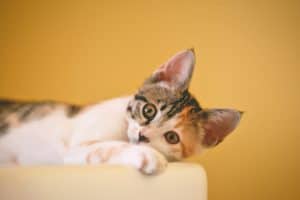Cats are known to make a variety of sounds, from purrs to meows to hisses. But have you ever heard a cat make a noise that sounds eerily similar to a raccoon? It’s a phenomenon that has puzzled many cat owners, leaving them wondering, “Why do cats make raccoon noises?”
When cats make raccoon noises, they are often exhibiting a behavior known as chattering. This unique sound is typically made when a cat is excited or stimulated by something they see, such as birds or squirrels outside. It is believed to be a sign of frustration or excitement, as the cat is unable to reach its prey.
What Causes Cats to Make Raccoon Noises?
Have you ever heard your cat making strange raccoon-like noises? You may wonder what’s going on in their feline minds when this happens. Rest assured, there are a few common reasons behind this peculiar behavior.
One possible explanation is that cats make raccoon noises as a form of communication. Just like raccoons, cats may vocalize to express agitation, excitement, or even frustration. So, if your furry friend starts chattering away like a raccoon, they might be trying to convey their emotions to you.
Another reason for this behavior could be instinctual. Cats are natural hunters, and their chattering could be a way of practicing their hunting skills. By mimicking the sounds of potential prey, such as birds or rodents, cats may be preparing themselves for the real deal.
Furthermore, cats may make raccoon noises out of sheer curiosity. Just like how we might imitate sounds we hear around us, cats might be experimenting with different noises just to see what happens. It’s all part of their inquisitive nature.
So, the next time your cat starts chattering like a raccoon, remember that it’s just their way of communicating, practicing their hunting skills, or simply being curious about the world around them. Embrace their unique vocalizations as a window into their feline minds.
Is Chattering in Cats Similar to Other Animal Sounds?
When it comes to chattering in cats, you might be curious about how it compares to similar noises made by other animals like raccoons and birds. While each species has its own distinct vocalizations, there are some interesting similarities worth exploring.
One key similarity is the purpose behind these sounds. Just like cats, raccoons and birds use vocalizations to communicate with each other. Whether it’s to signal danger, attract a mate, or establish territory, these noises play a crucial role in their social interactions.
Additionally, chattering in cats and other animals can also serve as a form of self-expression. By vocalizing, animals can convey their emotional state or intentions to those around them. This can help them navigate their environment and interact effectively with other members of their species.
Moreover, the physical act of chattering itself is comparable across species. The rapid movements of the jaw and tongue involved in producing these noises are a common feature shared by cats, raccoons, and birds. This suggests a universal aspect to this behavior that transcends species boundaries.
So, the next time you hear your cat chattering away, remember that they are engaging in a form of communication that is not unique to them. By recognizing the similarities between chattering in cats and other animal sounds, you can gain a deeper appreciation for the rich tapestry of vocalizations found in the animal kingdom.
Do All Cats Make Raccoon Noises?
Not all cats make raccoon noises. The chattering sound that some cats make is actually a behavior that is more common in certain breeds, such as Siamese, Burmese, and Oriental breeds. These breeds are known for their vocal tendencies and may be more inclined to make raccoon-like noises.
So, if your cat is not chattering like a raccoon, don’t worry, it’s perfectly normal! Each cat has its own unique personality and vocalizations. Some may never make these sounds, while others might do it frequently. It all boils down to individual cat traits and breed tendencies.
Remember, just like people have different ways of communicating, so do our feline friends. Embrace your cat’s unique quirks and sounds, whether they chatter like a raccoon or not!
Can Chattering in Cats Be Trained or Prevented?
Chattering in cats is a natural behavior that is often triggered by excitement or frustration. It’s like their way of expressing their emotions in a vocal manner. Trying to train or prevent a cat from chattering can be challenging and may not always be successful.
One way to potentially reduce chattering is by providing plenty of mental and physical stimulation for your cat. Interactive toys, scratching posts, and play sessions can help channel their energy in a positive way, reducing the need for excessive chattering.
However, it’s essential to remember that chattering is a normal behavior for some cats, and trying to completely eliminate it may not be necessary. Embrace your cat’s unique way of communicating and focus on providing a stimulating environment to keep them happy and healthy.
Tips for reducing chattering in cats:
- Provide plenty of toys and playtime to keep your cat entertained.
- Create a stimulating environment with scratching posts and climbing structures.
- Consider consulting with a veterinarian or animal behaviorist for further advice on managing chattering behavior in your cat.
Remember, every cat is different, so what works for one may not work for another. Embrace your feline friend’s quirks and provide a loving and engaging environment for them to thrive.
The Evolutionary Purpose Behind Chattering
Have you ever caught your cat making those strange chattering noises? It might seem like they’re imitating a chirping bird or a chatty raccoon, but there could be a fascinating evolutionary reason behind this behavior.
One theory suggests that cat chattering is a throwback to their hunting instincts. When a cat sees prey, such as a bird or squirrel, it gets excited and may vocalize its excitement through chattering. This behavior could be a way for cats to practice their hunting skills or communicate with other cats in the wild.
Another possible explanation is that chattering helps cats focus and prepare for a potential prey. By making these rapid sounds, cats may be honing their coordination and timing for the perfect pounce. It’s like they’re psyching themselves up for the hunt!
Next time you witness your cat chattering away, remember that this quirky behavior could be a glimpse into their wild, predatory nature. It’s a reminder that even our domesticated feline friends still carry some primal instincts deep within them.
Fun Facts About Cat Communication
Did you know that cats have a vast repertoire of meows, purrs, and chirps to communicate with us and other animals? Understanding these sounds can give you valuable insights into your cat’s emotional state and needs.
Purring isn’t always a sign of contentment. While we often associate purring with a happy cat, cats can also purr when they’re injured, scared, or in pain. It’s their way of self-soothing and seeking comfort.
Meows are reserved for humans. Cats rarely meow at each other, using this vocalization specifically for communicating with humans. So when your cat meows at you, they’re trying to tell you something important!
Chattering can be a sign of frustration. In addition to hunting instincts, cats may also chatter when they’re feeling frustrated or impatient. It’s like their way of expressing their eagerness to pounce on a tantalizing target.
By paying attention to these subtle cues in your cat’s communication, you can deepen your bond and better meet their needs. So the next time your feline friend starts chattering away, listen closely – they might be trying to tell you something interesting!
Alex, a passionate animal lover, has experience in training and understanding animal behavior. As a proud pet parent to two dogs and three cats, he founded AnimalReport.net to share insights from animal experts and expand his knowledge of the animal kingdom.




